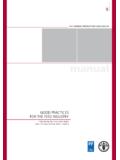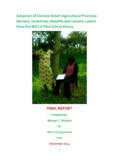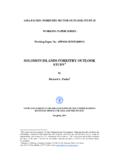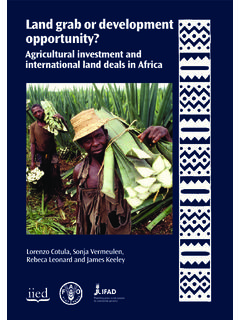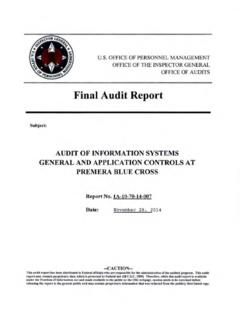Transcription of GUIDELINES FOR INTERNAL ADMINISTRATIVE …
1 GUIDELINES FOR INTERNAL ADMINISTRATIVE . INVESTIGATIONS BY THE office OF THE. inspector - general . INTRODUCTION. 1. The Organization is dedicated to maintaining a work place that fosters an environment of integrity on the part of its personnel. In support of this goal and pursuant to its Charter, the office of the inspector - general (AUD) has been given authority to investigate allegations of unsatisfactory conduct, including fraud and improper use of the Organizations' resources by FAO personnel, or other activity in breach of the Organization's Regulations, Rules, policies or procedures. 2. The object of investigative activity is to examine and determine whether unsatisfactory conduct has occurred and, if AUD determines that unsatisfactory conduct has occurred, to identify the person or persons responsible for such conduct.
2 Investigations are not disciplinary proceedings. They are fact finding activities that are ADMINISTRATIVE in nature. 3. The aim of these GUIDELINES is to ensure that allegations of unsatisfactory conduct are investigated thoroughly and impartially, protecting the interests of the Organization and upholding the rights and obligations of FAO personnel. With this in view, the GUIDELINES reflect the general principles for the investigative process contained in the Uniform GUIDELINES for investigation , 2nd edition, endorsed by the Conference of th International Investigators1 at their 10 Conference in June 2009, and present them in a form relevant to FAO. 4. These GUIDELINES take into account the relevant provisions set out in the Constitution, the Regulations and Rules of the Organisation, the ADMINISTRATIVE Manual, any relevant provision which may from time to time be issued through Director- general Bulletins and ADMINISTRATIVE Circulars, as well as principles of law as set out in the case law of the ADMINISTRATIVE Tribunal of the International Labour Organization (ILOAT).
3 APPLICABILITY. 5. These GUIDELINES apply to investigations carried out by AUD under its mandate. 6. These GUIDELINES apply to investigations into the conduct of FAO personnel, as defined in paragraph 16 of these GUIDELINES . They do not apply to investigations into the conduct of other, external, parties such as suppliers. 1. This is a professional community of practice comprising the investigation functions of the UN System, multilateral development banks and other public international organizations. 2. DEFINITIONS. 7. An investigation is designed to establish facts and circumstances concerning possible unsatisfactory conduct in order to determine whether unsatisfactory conduct has occurred and, if so, the person or persons responsible for such conduct. 8. A complaint is any allegation, claim, concern or information known to AUD, indicating possible unsatisfactory conduct by FAO personnel, which AUD may investigate.
4 9. A complainant is a party, person or entity, making a complaint to AUD. 10. Failure to cooperate with an investigation means obstructing or deceptively inhibiting an FAO investigation , including but not limited to not responding fully and/or timely to AUD inquiries; not providing complete and/or accurate documentation or other information that AUD requests; intentionally providing misleading information;. destroying, altering, or concealing evidence; intimidating, harassing and/or threatening any potential witness to prevent the disclosure of facts relevant to the investigation ; or misrepresenting facts. 11. A witness is an individual who provides information to AUD relevant to an investigation . 12. The subject of an investigation is a person concerning whom AUD has credible and reliable information, which suggests that s/he may have engaged in unsatisfactory conduct and/or wrongdoing.
5 13. Retaliation means any direct or indirect detrimental action recommended, threatened or taken towards an individual who has reported unsatisfactory conducted or provided information concerning the same. When established, retaliation in itself constitutes unsatisfactory conduct, that may lead to ADMINISTRATIVE or disciplinary action. 14. Conflict of interest The Standards of Conduct for the International Civil Service state in paragraph 21 that a conflict of interest includes circumstances in which international civil servants, directly or indirectly, would appear to benefit improperly, or allow a third party to benefit improperly, from their association in the management or the holding of a financial interest in an enterprise that engages in any business or transaction with the organization. A conflict of interest may arise when a member of FAO personnel's personal interest(s) potentially or actually conflict with his or her professional interests and responsibilities towards the Organization.
6 15. Unsatisfactory conduct by FAO personnel is conduct which is incompatible with his or her undertaken or implied obligation to the Organization or failure to comply with the requirements of Article I of the Staff Regulations. The Manual paragraph provides a non-exhaustive list of examples of unsatisfactory conduct. 16. FAO personnel means staff members and other persons engaged by the Organization, within the meaning of Staff Regulation It includes inter alia personnel specially engaged for conference and other short-term service, consultants, subscribers to Personnel Services Agreements, volunteers, Associate Professional Officers, part- time personnel, field project personnel, National Professional Officers and personnel locally recruited for services in established offices away from Headquarters. 3. STANDARD OF PROOF.
7 17. The standard of proof use to determine whether a complaint is substantiated is preponderance of evidence. RECEIVING COMPLAINTS. 18. The Standards of Conduct for the International Civil Service state in paragraph 19, that it is the duty of international civil servants to report any breach of the organization's rules and regulations to a higher level official, whose responsibility it is to take appropriate action . If a member of FAO personnel becomes aware of, or receives information regarding suspected fraud or other unsatisfactory conduct, it is his/her duty to report the matter promptly. Unsatisfactory conduct and/or wrongdoing may be reported to AUD directly or to supervisors or FAO Representatives who have an obligation, as recipients of complaints, to report them promptly to AUD. Such complaints need not to include firm evidence of the alleged unsatisfactory conduct and/or wrongdoing, however, they should be grounded in reasonably reliable information.
8 19. AUD considers all complaints irrespective of source. Complaints may be presented to AUD with attribution or anonymously. Where the complainant identifies him/herself AUD acknowledges receipt of the complaint. AUD may itself establish a complaint based on indicators of fraud or other unsatisfactory conduct that it identifies in the course of its INTERNAL audits or other work. AUD registers all complaints received in an AUD complaints database, and AUD reviews them to determine whether they fall within its mandate. Complaints falling within AUD's mandate are subject to a preliminary review. 20. Complaints concerning any AUD personnel must be reported directly to the inspector - general . Complaints concerning the inspector - general must be reported to the Director- general . PRELIMINARY REVIEW. 21. Each complaint that raises issues within the mandate of AUD is subject to a preliminary review to assess the credibility of the allegation and to determine whether a full investigation is warranted.
9 A preliminary review generally includes an interview of the complainant and a review of the documents submitted by the complainant, if any. It will consists of any additional investigative steps identified by AUD to be necessary to determine whether a full investigation is warranted. 22. During the preliminary review, the potential subject of an investigation is not notified of either the decision to initiate a preliminary review or of the allegations involved unless AUD determines that it is necessary under the circumstances. 23. If, as a result of a preliminary review, AUD concludes that a complaint does not warrant an investigation , AUD closes the matter. AUD may nonetheless refer the matter to another office within FAO for a determination as to whether any action by that office would be appropriate. No reference to AUD's preliminary review is included in the confidential personnel file of the potential subject.
10 Where the potential 4. subject was notified of the preliminary review, s/he is notified promptly in writing of the closure of the case. If the potential subject of an investigation was not notified of the preliminary review, s/he is not notified of the decision to close the matter without an investigation . 24. If AUD closes a case at the completion of the preliminary review, AUD documents the reasons for this decision in its INTERNAL files. 25. If, as a result of the preliminary review, AUD determines that the complaint falls within the investigative competence of an external institution, including another organization of the United Nations system, the complaint may be forwarded to the relevant institution. The information forwarded does not disclose the identity of the complainant, unless s/he has agreed to the disclosure.

